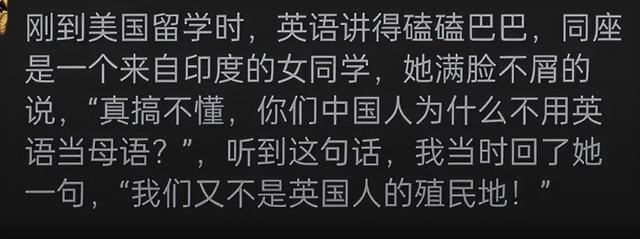L | A (Translated with ChatGPT)
Source: Humorous Zebra
Sigh, speaking of why English hasn’t aggressively 'invaded' our Chinese language system like some other languages have—friends in the comments section really hit the nail on the head! Their analysis is so spot-on that it leaves you amazed!
We Chinese, when we speak, emphasize subtlety, nuance, and meaning beyond words. The straightforward, direct way of expression in English sometimes just can’t fully convey the delicate intricacies of Chinese.

"When Chinese was at its hardest, it was almost about to be replaced by Latin "
"
It wasn’t difficult at all; it was just brought up at the time to make learning easier, but it was never actually implemented

"When I first went to study in the U.S., I struggled with speaking English fluently. A classmate of mine, an Indian girl, looked puzzled and asked, 'I really don't understand, why don't you Chinese use English as your mother tongue?' Hearing that, I replied, 'Well, we're not a British colony!'"
Haven’t you noticed? The English modified by Chinese people is even more concise. Chinese is the most succinct language in the world

"China is now able to influence English. 'Long time no see' has already become an accepted English phrase."
There's also 'people mountain people sea'
(Note 1: The phrase "long time no see" is an example of Chinglish—English influenced by Chinese syntax. It directly translates from the Chinese phrase "好久不见" (hǎo jiǔ bú jiàn), meaning "It’s been a long time since we last met.")
(Note 2: This refers to a Chinglish phrase that mimics the Chinese idiom 人山人海, meaning a sea or mountains of people.)

"In the future, Americans will also say: 'you see see you, one day day de


 '"
'"
They don't understand
(Note: This sentence humorously mimics how some English phrases are translated or understood in a non-native context, particularly in Chinglish. "You see see you" imitates "You see," but with repeated syllables, while "one daydayde" mimics the phrase "one day" with exaggerated repetition)

"This isn't about learning English in elementary school for cultural integration; instead, it ends up producing Chinglish "
"
Chinglish is much more concise than formal English!

"'Long time not see' has already appeared in some high school teaching materials. It was previously recognized by foreigners, but I didn't expect that we would actually teach it too

 Is this the power of Chinese assimilation?"
Is this the power of Chinese assimilation?"
There are many of us, you make a change [a flash of inspiration].

"The main thing is that Chinese is really charming; a single sentence is like a hyperlink. If you ask English to translate a phrase like '鸿门误' (The Hongmen Incident), and then consider the meaning of 以前喜欢一个人,现在喜欢一个人 ("I liked someone before, and now I like someone else") the way Chinese can convey opposite meanings, imply derogation while secretly praising, or use ambiguous tones, makes Chinese so vibrant."
Most Hongkongers during the British colonial era preferred to use Cantonese rather than English. Firstly, the British were not very invested in Hong Kong's education sector, and the costs for primary and secondary schools were not low. Most Hongkongers attended schools run by their local associations.

"Since childhood, I’ve wondered why the whole world doesn’t unify its languages."
We can blame Xu Fu for this. If he had found the elixir, wouldn’t languages be unified?
(Note: Xu Fu was an alchemist and explorer, known for his voyages to find the elixir of immortality during the Qin Dynasty.)

"I've been learning English since elementary school, but that didn’t stop me from still failing the exams "
"
I'm different. By the time I graduated from college, I could score 130 in English exams, but that doesn’t stop me from only being able to say 'how are you,' 'I'm fine,' and 'thank you'.
(Note: The phrases "豪啊油" (how are you), "俺坏" (I’m fine), and "三q" (thank you) are humorous phonetic transliterations of basic English phrases into Chinese characters, often used in a playful or mocking way to emphasize minimal English-speaking ability)

"It’s all my charming ancestors' fault for not making the whole world speak Chinese. Imitation "
"
If we’re going to blame someone, it should be Xu Fu. He just wanted an elixir of immortality, but not only did Xu Fu not give it to Emperor Qin Shi Huang, he also poisoned him

"China still hasn’t created new characters for new things, and that is the charm of Chinese. The keyboards of the internet age haven’t replaced our writing, while you all have to reorganize vocabulary for every new thing that appears. English is the simplest language in the world, while Chinese is the most elegant."
We have idioms, proverbs, and various rhetorical devices, such as metaphors, personification, and parallelism, all of which enrich our language and make it vibrant and interesting.
Although English also has its ways of expression, in many cases, it truly struggles to fully replicate the charm and beauty of Chinese.
For example, when we say, '落花有意流水无情' ('Fallen flowers have intentions, while flowing water is heartless'), the nuance of that sentiment loses a lot when expressed in English.
Therefore, English has not managed to infiltrate and invade our Chinese language. We Chinese have a deep affection and pride for our language, while also maintaining an open and inclusive attitude towards foreign cultures.
This cultural confidence and the influence of our linguistic environment enable us to absorb and learn from the strengths of foreign cultures while preserving our cultural characteristics, making our language even more diverse, lively, and interesting.
In summary, the friends in the comments section are absolutely right; their words hit the nail on the head and are very insightful! Our Chinese language is the root and soul of us Chinese people and is an important embodiment of our cultural confidence. We must cherish it, inherit it, and promote it!
Source: Humorous Zebra
Sigh, speaking of why English hasn’t aggressively 'invaded' our Chinese language system like some other languages have—friends in the comments section really hit the nail on the head! Their analysis is so spot-on that it leaves you amazed!
We Chinese, when we speak, emphasize subtlety, nuance, and meaning beyond words. The straightforward, direct way of expression in English sometimes just can’t fully convey the delicate intricacies of Chinese.

"When Chinese was at its hardest, it was almost about to be replaced by Latin
It wasn’t difficult at all; it was just brought up at the time to make learning easier, but it was never actually implemented

"When I first went to study in the U.S., I struggled with speaking English fluently. A classmate of mine, an Indian girl, looked puzzled and asked, 'I really don't understand, why don't you Chinese use English as your mother tongue?' Hearing that, I replied, 'Well, we're not a British colony!'"
Haven’t you noticed? The English modified by Chinese people is even more concise. Chinese is the most succinct language in the world

"China is now able to influence English. 'Long time no see' has already become an accepted English phrase."
There's also 'people mountain people sea'
(Note 1: The phrase "long time no see" is an example of Chinglish—English influenced by Chinese syntax. It directly translates from the Chinese phrase "好久不见" (hǎo jiǔ bú jiàn), meaning "It’s been a long time since we last met.")
(Note 2: This refers to a Chinglish phrase that mimics the Chinese idiom 人山人海, meaning a sea or mountains of people.)

"In the future, Americans will also say: 'you see see you, one day day de
They don't understand
(Note: This sentence humorously mimics how some English phrases are translated or understood in a non-native context, particularly in Chinglish. "You see see you" imitates "You see," but with repeated syllables, while "one daydayde" mimics the phrase "one day" with exaggerated repetition)

"This isn't about learning English in elementary school for cultural integration; instead, it ends up producing Chinglish
Chinglish is much more concise than formal English!

"'Long time not see' has already appeared in some high school teaching materials. It was previously recognized by foreigners, but I didn't expect that we would actually teach it too
There are many of us, you make a change [a flash of inspiration].

"The main thing is that Chinese is really charming; a single sentence is like a hyperlink. If you ask English to translate a phrase like '鸿门误' (The Hongmen Incident), and then consider the meaning of 以前喜欢一个人,现在喜欢一个人 ("I liked someone before, and now I like someone else") the way Chinese can convey opposite meanings, imply derogation while secretly praising, or use ambiguous tones, makes Chinese so vibrant."
Most Hongkongers during the British colonial era preferred to use Cantonese rather than English. Firstly, the British were not very invested in Hong Kong's education sector, and the costs for primary and secondary schools were not low. Most Hongkongers attended schools run by their local associations.

"Since childhood, I’ve wondered why the whole world doesn’t unify its languages."
We can blame Xu Fu for this. If he had found the elixir, wouldn’t languages be unified?
(Note: Xu Fu was an alchemist and explorer, known for his voyages to find the elixir of immortality during the Qin Dynasty.)

"I've been learning English since elementary school, but that didn’t stop me from still failing the exams
I'm different. By the time I graduated from college, I could score 130 in English exams, but that doesn’t stop me from only being able to say 'how are you,' 'I'm fine,' and 'thank you'.
(Note: The phrases "豪啊油" (how are you), "俺坏" (I’m fine), and "三q" (thank you) are humorous phonetic transliterations of basic English phrases into Chinese characters, often used in a playful or mocking way to emphasize minimal English-speaking ability)

"It’s all my charming ancestors' fault for not making the whole world speak Chinese. Imitation
If we’re going to blame someone, it should be Xu Fu. He just wanted an elixir of immortality, but not only did Xu Fu not give it to Emperor Qin Shi Huang, he also poisoned him

"China still hasn’t created new characters for new things, and that is the charm of Chinese. The keyboards of the internet age haven’t replaced our writing, while you all have to reorganize vocabulary for every new thing that appears. English is the simplest language in the world, while Chinese is the most elegant."
We have idioms, proverbs, and various rhetorical devices, such as metaphors, personification, and parallelism, all of which enrich our language and make it vibrant and interesting.
Although English also has its ways of expression, in many cases, it truly struggles to fully replicate the charm and beauty of Chinese.
For example, when we say, '落花有意流水无情' ('Fallen flowers have intentions, while flowing water is heartless'), the nuance of that sentiment loses a lot when expressed in English.
Therefore, English has not managed to infiltrate and invade our Chinese language. We Chinese have a deep affection and pride for our language, while also maintaining an open and inclusive attitude towards foreign cultures.
This cultural confidence and the influence of our linguistic environment enable us to absorb and learn from the strengths of foreign cultures while preserving our cultural characteristics, making our language even more diverse, lively, and interesting.
In summary, the friends in the comments section are absolutely right; their words hit the nail on the head and are very insightful! Our Chinese language is the root and soul of us Chinese people and is an important embodiment of our cultural confidence. We must cherish it, inherit it, and promote it!